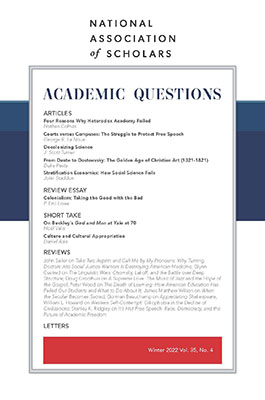To the Editor:
“For the Record” in the Fall 2022 issue of AQ deserves more comment,
It is not simply that the linear-non-threshold theory (LNT) is wrong; far worse, it suppresses general recognition of the phenomenon of hormesis: sufficiently low doses may be positively beneficial, of things that are harmfully toxic at large exposures.
Edward Calabrese, one of the authors of that letter to the National Academy, has published a great deal about hormesis. I first became aware of the phenomenon through Joel Kauffman’s invaluable book Malignant Medical Myths (The myths concern the effects of aspirin, low-carbohydrate diets for weight loss, cholesterol, blood pressure, and other popularly believed shibboleths).
Once one learns of the phenomenon of hormesis, it seems obvious: it is the basis for immunization or vaccination, where sufficiently small doses of a specific insult prepare the immune system to ward off future, dangerously large insults from the same specific substance or radiation.
But stimulation of the immune system by a specific thing activates the immune system also in a more general way, making for more broadly healthful outcomes. Similarly, vaccines quite often include such so-called adjuvants as squalene or certain aluminum compounds that are toxic at large doses, while at the small amounts used in the vaccines they arouse the immune system so that it reacts more strongly to the specific substance being vaccinated against.
“For the Record” points out that what the public learned about the National Academy discussion was starkly at variance with what the expert panel actually concluded. That may be shocking but it is far from surprising, as the old insight has it. A recent illustration that deserves to be much more widely appreciated is the 2021 book, Unsettled, by Steven Koonin, which points out that the Executive Summaries in official Reports of the International Panel on Climate Change (IPCC) are frequently at variance with the actual data and statements in the technical sections of those reports. Some further examples and general discussion are given in my book about Dogmatism in Science and Medicine (2012).
Henry Bauer
Professor Emeritus of Chemistry & Science Studies
Virginia Polytechnic Institute & State University
To the Editor:
I would like to comment on David Rozado's well researched article "Themes in Academic Literature: Prejudice and Social Justice" (Summer 2022) in which he examines the prevalence over the last fifty years of terms considered to denote prejudice in both the academic literature and the popular media. Over this interval old terms have continued, and new terms have appeared in response to changing social and political circumstances.
On reflection I think it is worth noting that the terms used to denote prejudice which he examines are often used in our political discourse in a way that is quite prejudicial. In this arena they are often used as weapons to stigmatize a person or groups of persons as a means of marginalizing and isolating those to whom the terms are applied.
The political left often makes use of the terms noted in the article as a way of silencing those who may have principled and objective disagreement without having to engage their opponents in discourse or debate. For example: those individuals embracing the principle of judging people by the content of their character, abilities, and achievement, and thus committed to merit-based admissions, employment, and promotion, and opposed to racially based quotas may be vilified as "racists" or "white supremacists"; similarly, persons who acknowledge that recent studies have shown that the current monkey pox outbreak is occurring overwhelmingly in men who organize their lives around homosexual eroticism (96-98 percent) and suggest that such results have meaning with regard to policy toward this behavior may be maligned as homophobes.
Rozado suggests extending his inquiry to additional institutions. I think an interesting avenue of investigation would be to examine the use of prejudicial assertions by the political left and right. Not to say that the political right does not use such language, but most of the terms in the article, at least to my experience, are utilized much, much more by the political left than the right. A study which investigates the use of prejudicial assertions in political discourse, the frequency with which such accusations are used by the left and right and how the media spins these could be quite revealing.
The utilization of such language as a weapon to stifle debate poisons our political fabric and as such should be called out as much as the alleged ills to which it supposedly refers. Such an inquiry could open up an entire new field of disparities research!
David Sundheimer
Phoenix, Arizona













